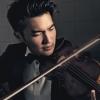
Since his appearance at age 13 on The Ed Sullivan Show in 1958, Itzhak Perlman has done much to popularize classical violin. Trained at conservatory in Tel Aviv, Perlman first came to the U.S. to study at Juilliard. Though stricken with polio at age four, Perlman is ambulatory on canes and an electric scooter, and has concertized and recorded worldwide. He has also conducted and occasionally sung and has deployed his violin with orchestras and smaller chamber, jazz, pop, and klezmer ensembles.
His wife, violinist Toby Perlman, co-founded the Perlman Music Program as a camp for adolescent violinists, and it has expanded to a year-round program, involving her husband. In 2015, Perlman was awarded the Presidential Medal of Freedom by Barack Obama, whose inauguration he’d regaled alongside cellist Yo-Yo Ma and clarinetist Anthony McGill. The eclectic maestro will conduct and perform with the San Francisco Symphony next week in a program of Tchaikovsky, Elgar, and Bach (featuring principal oboist Eugene Izotov), will return for the Symphony’s Hollywood-themed Opening Night Gala on September 5, and will celebrate his Jewish roots in a January 14, 2019 program titled In the Fiddler’s House.
Perlman spoke with SFCV from the city of his beloved home team, the New York Mets.
So I’m reminded that you played the national anthem a couple of years ago for the Mets’s wildcard playoff game a couple of years ago, against our Giants.
And if I remember correctly, you won.

I was pointing out to the Mets that I played twice the national anthem, and both times they lost! I’m not such a good omen, but they know that I’m a great fan. Last night we had a great game: we won in the 10th inning, by a home run by Jay Bruce, who has not been hitting well, but hit a triple and a home run. And [Yoenis] Cespedes, who has not been hitting at all, hit a three-run homer.
I guess there’s room for that kind of variation in the game of baseball, but not in performance on violin. You can’t just say, “Perlman may have flubbed five notes, but maybe in his next outing he’ll be perfect.”
Actually, you wouldn’t remember Perlman missing those five notes, because the next performance is another performance; it’s not like one performance colors everything you do. I would have to go a long way not to be hired.
Plus which, nobody has a scoreboard behind you when you’re sitting up there onstage.
Where the commentary would be, “On page six of the score, he missed a note, and he’s been missing that note for the last two seasons.”
How far back does baseball go for you?
I was listening to it on the radio when I could hardly talk in English. And I remember very clearly the game where Bill Mazeroski homered against Ralph Terry, and the Pittsburgh Pirates won the [1960] World Series, when I was still a Yankees fan, before the Mets. Later my wife Toby [a native New Yorker], who’d been a Brooklyn Dodgers fan, naturally went for the Mets.
Violin goes back much further for you, when you were three, back in Israel, and you heard Jascha Heifetz on the radio.
The first thing that attracts you is the sound. I just felt I wanted to do that.
When you developed polio a year later, did it get in your way?
No, it was just an early intermission. And then I continued.

I studied with him and with Dorothy DeLay, who was at that time his assistant. Galamian was more like the teacher I’d had in Israel, very straightforward: do what I tell you, and you’ll play well. And DeLay was move about involving the student in the process. You’d play something for her and she’d say, “what do you think of that?”
And that combo worked for you?
You get the positive thing from both styles. But the way I teach right now is more like Miss DeLay.
And that carries over to your Perlman Music Program?
Absolutely, in its positiveness. The philosophy is to make students feel good about themselves and what they do.
You’ve spoken and written about the importance of working together to learn and make music.
In the Program, we make everybody sing in chorus, because it’s another experience; both musically and socially, that’s unusual for string players. It’s a different repertoire, as well.
How else does your approach to teaching differ?
We try to get competition out of the equation. The only competition is to get into the Program, but once in, we encourage everybody to just do the best that they can do. In the orchestra, for example, we always rotate seats.
After next week’s classical program, you’ll be returning to Davies Hall later this year and early next year to perform in Hollywood and klezmer programs. And you’ve also played with jazz greats.
But mostly I’m sticking to my day job.
In jazz, who has impressed you?
Oscar Peterson, Art Tatum. I concentrate on the virtuosity of those pianists.




